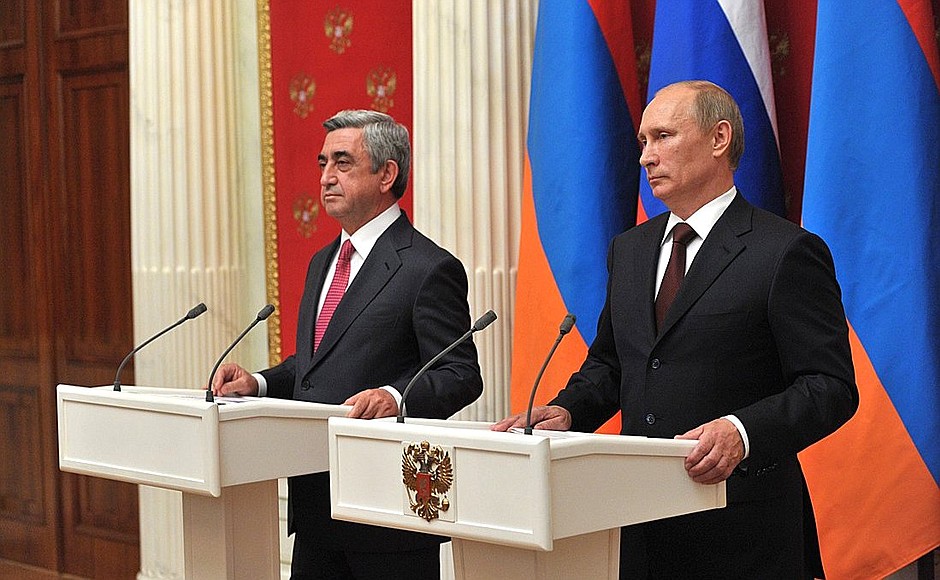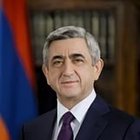
President of Russia Vladimir Putin: Good afternoon, ladies and gentlemen,
We have finished our talks with the President of Armenia. I want to start by thanking Mr Sargsyan for accepting our invitation and coming to Moscow today and giving us this opportunity, which we will continue informally now, to discuss the full spectrum of our relations.
I mentioned at the start of our meeting that we are celebrating two symbolic dates this year: 20 years since our two countries established diplomatic relations, and 15 years since we signed the Treaty on Friendship, Cooperation and Mutual Assistance. In this respect it gives me particular pleasure to speak of our achievements so far this year, and we do have results to show.
In the economy, we have practically come back to the pre-crisis level of around $1 billion in trade turnover. I agree with Mr Sargsyan that this is not enough for our two countries and that we can and must go even further.
I hope that the Intergovernmental Commission, which will start work very soon (with the Transport Minister [Maxim Sokolov] as co-chairman on the Russian side), will draft the cooperation programme for our economic relations through to 2020. This will be something like a roadmap for our trade and economic ties.
We place a lot of importance on developing interregional ties. In this respect, I note that more than 70 Russian regions are involved in such ties. Interregional cooperation is developing specific organisational forms now too: the first Interregional Forum took place in Yerevan in April 2011, and the second such forum is scheduled for November this year.
I am sure you will agree with me that direct contacts between our regions are extremely important. They help to reduce red tape in economic relations and make them more vibrant, concrete and effective.
We discussed today the prospects for increasing our cooperation within the CIS, CSTO and other international organisations. We spoke more broadly about the integration projects underway in the post-Soviet area and reflected on what we need to do to make use of the latest integration agreements. We agreed to establish a joint commission to look at how we can make use of the latest Customs Union cooperation agreements between Russia, Kazakhstan and Belarus with regard to Armenia and its specific situation. Armenia does not have any common borders with us after all, but we can reflect on ways to use some of the instruments the three countries have agreed on.
Of course, we also devoted considerable attention to the Nagorno Karabakh issue and exchanged our views on the situation with negotiations. I stress in this respect Russia’s continued commitment to playing an active part as a mediator through its role as co-chair of the OSCE’s Minsk Group.
I am happy with the meeting’s results and once more I want to thank Mr Sargsyan for finding the time and accepting our invitation to come to Moscow.
Thank you for your attention.
President of Armenia Serzh Sargsyan: Thank you, Mr President. It is a genuine pleasure to meet with you again.
I am happy to see that the Armenian-Russian strategic partnership, based on the time-tested friendship between our peoples, continues its steady growth. Our countries have reached a complete mutual understanding on foreign and domestic policy matters.
The regular political dialogue at all levels and active contacts between our parliaments and at the regional level play a big part in strengthening our partnership.
We looked at how to strengthen the institutions underpinning our bilateral cooperation today and discussed the need for more frequent exchanges and consultations at every level, including at the higher levels.
Armenia has always strived for peace and stability in the Caucasus. This is the goal of our policy to reach a peaceful and lasting settlement of the Nagorno Karabakh conflict. We think that Russia plays a key part in security issues in the South Caucasus. This applies too, to Russia’s constructive efforts to settle the Nagorno Karabakh issue, which are extremely important for Armenia. Mr President, we thank you for Russia’s constant attention and effective efforts in this area.
We seek to continue our effective cooperation, based on mutual consideration for each other’s interests, within international and regional organisations. We will continue our efforts to make our foreign policy coordination in international forums more effective.
Armenia is a strong supporter of reinforcing the CSTO and we will continue to make the necessary efforts to develop this organisation. Armenia will host the CSTO Rapid Reaction Force’s military exercises in September.
Our military and military technical cooperation continue to develop well. We discussed today new possibilities for expanding our cooperation in the defence industry and in training for military personnel.
We extended the lease of the Russian military base in Armenia in 2010. Our position is that having the military base on our soil is in the interests of our country’s security. The protocol that we signed also expands possibilities for using the base in the event of a threat to Armenia’s security.
Russia’s economic presence in Armenia is in the strategic interests of both countries. Russia is Armenia’s main trade partner and accounts for more than half of all foreign investment in our country.
The joint implementation of a number of big projects such as construction of new units at the Metsamor Nuclear Power Plant and possible Russian participation in infrastructure projects in Armenia are evidence of our long-term economic ties.
Of course, we also discussed today the important matter of prices for natural gas supplies to Armenia. I think that we have reached a common understanding on the price: it will be based on the real market price multiplied or divided (as you wish) by Armenia’s natural gas supply needs at costs comparable to regional prices and that can ensure the Armenian economy remains effective.
Mr Putin confirmed that Russia wants to see a strong, competitive and developed Armenia. This is the approach of a true ally. I thank the Russian President for his clear position on all of the issues on our agenda.
I took the opportunity to invite President Putin to make a state visit to Armenia at any convenient time for him.
Thank you very much.
Question: Mr Sargsyan, Mr Putin, what do you think of the performance of Armenian and Russian athletes at London Olympics? An ethnic Armenian Arsen Galstyan won Russia’s first gold medal, and we were all enthralled by boxer Mikhail Aloyan’s performance, and wish him good luck on August 10.
Vladimir Putin: We congratulate all the athletes on their great success at the Olympics, whatever their ethnic background. As I said to your Russian colleagues yesterday, in some events we hoped for better results, and in other events we have achieved some completely unexpected results. Sport is sport. Whatever the case, we are proud of our athletes. The Games are not over yet and it is still early to sum up the results. We will analyse the results and make our conclusions later. Right now, I want to congratulate those who have achieved outstanding results, and I stress that Russia will continue its unfailing support for the Olympic movement and its principles.
Serzh Sargsyan: I think you already said everything in your question. Of course, Galstyan’s victory is a valuable symbol for everyone who treasures Armenian-Russian cooperation, and it just goes to show that together we are stronger. By the way, Armenia’s Olympic team includes athletes who were born in Russia. I think our team has done quite well overall and I wish them success over the remaining days of the Olympics.
Question: Let me apologise straight away for asking a question that is not about Russian-Armenian relations, but today is August 8 – the fourth anniversary of the conflict in South Ossetia, and so I wanted to ask you about your personal involvement in the events of those days. I asked you yesterday about the film that our South Ossetian colleagues made about those events. The film asserts, in particular, that you telephoned from Beijing, where you were at that moment, on August 8. Did you really call from Beijing? And is it true that Russia did not have an action plan ready in the event of Georgian military aggression against South Ossetia? Could you answer these questions? Thank you.
Vladimir Putin: There was a plan in place, and I think it is no secret that Russia’s forces acted in accordance with this plan. I have spoken about this publicly before, and as I say, it is no secret. The General Staff drew up this plan somewhere in late 2006 or early 2007. I approved it. Furthermore, this plan was used as the basis for training South Ossetian volunteer forces. True, our military specialists, to be honest, did not place much hope in this work, given that resisting any country’s regular armed forces, even those of a small country like Georgia, is impossible. But these volunteer forces nevertheless played a much-needed part in the end and courageously defended their homeland. Over the three days before the Russian armed forces arrived, it was essentially just they and our peacekeepers who were holding off the Georgian forces. So, they did play their part. We mobilised military equipment and arms and so on in accordance with the plan. There is no secret here. We have already discussed all of this.
As for telephone calls, I called Mr Medvedev twice, on August 7 and 8, and I called the Defence Minister. We discussed the situation.
